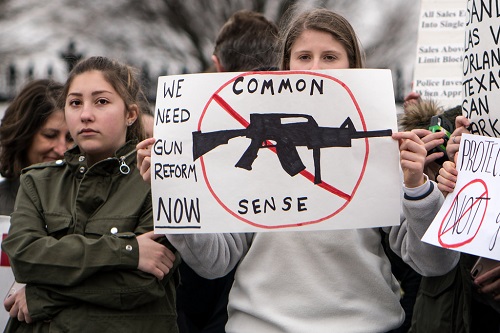Lorie Shaull photo
By
Sohail Mahmood
In 2012 a gunman killed 20 children and six adults in Sandy Hook Elementary School in Newtown, Connecticut. The tragedy devastated the nation.
Since the shooting, there have been more than 1,600 mass shootings, killing more than 1,800 people and wounding more than 6,400. Many of these events led to protests and calls for actions. However, the United States’ Congress refused to budge every time.[1] After the recent Florida shootings the debate on gun control is raging across the country. Last week several American corporations publicly ended their relationship with the NRA. The list included Delta Air Lines, Met Life insurance and Hertz car rental.
On February 28, 2018, Dick’s Sporting Goods, a large gun seller, announced that it was ending sales of all assault weapons and would end gun sales to anyone below the age of 21. Earlier, the giant retailer Walmart also stopped the sale of semi-automatic guns.[2] Meanwhile, Governor Rick Scott has proposed raising the minimum age to buy assault rifles to 21 and allowing police to confiscate guns from troubled individuals. He also proposed the expansion of background checks.
This time things are different as the gun control advocates have been galvanized by the Florida incident. The student community, along with their parents are leading the charge now. They are very active in social media and are protesting in the streets. It is amazing to see the kids out there advocating for sensible gun laws in the county. Truly, a remarkable development in the United States. In a nut shell, the timing is right for some bold measures, some be taken immediately.
The United States can and should study from success stories elsewhere. We can consider the gun laws in Japan as a model. Japan has one of the lowest rates of gun crime in the world. In 2014 there were only 6 gun deaths, compared to 33,599 in the US. What is the secret? If you want to buy a gun in Japan, you need patience and determination. You must attend an all-day class, take a written exam and pass a shooting-range test with a mark of at least 95%. There are also mental health and drug tests. Your criminal record is checked, and police look for links to extremist groups. Then they check your relatives too – and even your work colleagues. And as well as having the power to deny gun licenses, police also have sweeping powers to search and seize weapons.[3] The US must look at other countries for solutions. Other than Japan, we must look at Germany, Australia and the UK also. Much can be done as the impetus to reform is already there.
The following are now urgently required:
1 – Ban on sale of assault weapons/semi-automatic weapons. These weapons can fire rounds twice, three times as fast as a handgun. Today this is the primary demand from gun-control advocates.
2 – No purchases of guns under the age of 21.
3 – A ban on “bump stocks,” a device that enables semi-automatic weapons to fire faster. It can make a legal semi-automatic weapon fire more like an illegal fully automatic gun. This proposal has the most bipartisan support of all gun-control measures.[4]
4 – Improve the federal background-check system to block gun sales to people having a history of mental-health problems. The most recent change to background checks came in 1993 when Congress instituted a federal background-check system. But gun-control advocates say that system leaves much to be desired. It’s understaffed and underfunded, and there are ways to get around it by buying a gun at largely unregulated gun shows or online.
Gun-control advocates’ number one priority is to pass a law requiring any gun purchaser to undergo a comprehensive background check. Right now, people who buy guns at gun shows and online do not have to go through a background check.
Sohail Mahmood
Sohail Mahmood is an independent global affairs analyst and the author of several books, monographs and research articles on Middle East and South Asian politics, governance and development issues. He has taught for about 30 years in various universities of Pakistan and US and has worked as a consultant for the World Bank, CIDA, SDC, IUCN and UNDP. Sohail is married and has two grown sons. He lives in Raleigh, North Carolina, United States.
[1] German Lopez, “I’ve covered gun violence for years. The solutions aren’t a big mystery”, Vox, February 21, 2018
https://www.vox.com/policy-and-politics/2018/2/21/17028930/gun-violence-us-statistics-charts, accessed February 28, 2018
[2] Julie Creswell. “Dick’s Sporting Goods, a major gun retailer, Stops Selling Assault style Weapons, , New York Times, February 28, 2018, https://www.nytimes.com/2018/02/28/business/dicks-major-gun-retailer-will-stop-selling-assault-style-rifles.html?hp&action=click&pgtype=Homepage&clickSource=story-heading&module=first-column-region®ion=top-news&WT.nav=top-news, accessed February 28, 2018
[3] Harry Low, “How Japan has almost eradicated gun crime”, BBC.com, January 2017, http://www.bbc.com/news/magazine-38365729, accessed February 28, 2018
[4] Amber Phillips, “What will Congress realistically do on guns after the Florida shooting?”, The Washington Post, February 26, 2018, https://www.washingtonpost.com/news/the-fix/wp/2018/02/26/what-will-congress-realistically-do-on-guns-after-the-florida-shooting/?utm_term=.5a7c76ddf967, accessed February 28, 2018



No Comments Yet!
You can be first to comment this post!